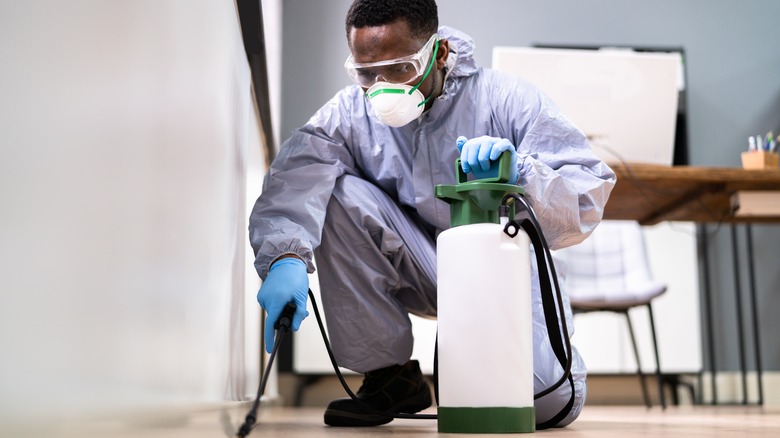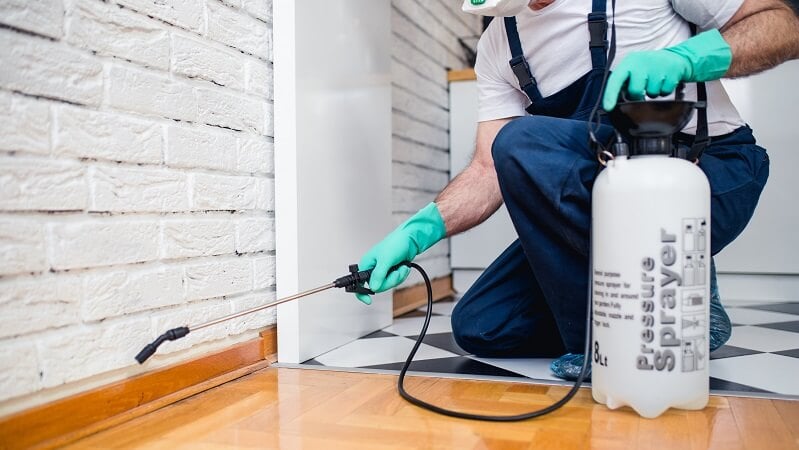Top-rated Pest Control Clovis Providers: Your Peace of Mind
Wiki Article
Comprehending the Numerous Methods to Bug Control: A Comprehensive Guide

Natural Insect Control Methods
Employing eco-friendly strategies such as buddy planting and organic insect control is important for effectively taking care of bugs in agricultural setups. Companion growing includes expanding various crops in distance to discourage parasites, boost nutrient uptake, and improve total plant health.Organic pest control entails introducing all-natural predators or virus to control pest populaces. Ladybugs, as an example, prey on aphids, managing their numbers without the demand for chemical pesticides. One more example is making use of Bacillus thuringiensis (Bt), a germs that targets specific insect bugs while being harmless to people, pets, and useful insects.
These eco-friendly techniques not just decrease the dependence on artificial pesticides however additionally help maintain biodiversity and soil health and wellness. By including natural bug control strategies into agricultural techniques, farmers can accomplish sustainable parasite management while lessening adverse effect on the atmosphere.

Chemical Parasite Control Solutions
Along with natural insect control techniques, the use of chemical parasite control solutions plays a significant function in properly taking care of pest populaces in farming environments. Chemical pest control services are formulated to target particular insects that may trigger substantial damages to plants. These remedies usually contain synthetic chemicals that are made to get rid of parasites promptly and efficiently.Among the vital benefits of chemical parasite control options is their efficiency in managing insect infestations on a large range. Farmers can use these remedies utilizing different methods such as splashing, airing out, or seed treatment to safeguard their crops from unsafe pests, weeds, and conditions. Furthermore, chemical insect control solutions are reasonably very easy to apply and can provide quick outcomes, helping farmers safeguard their returns and lessen economic losses.
Nevertheless, it is necessary to make use of chemical insect control remedies carefully to reduce possible unfavorable influences on the atmosphere, non-target microorganisms, and human health and wellness. Correct application methods, adherence to safety and security guidelines, and normal tracking are essential to make sure the responsible usage of chemical parasite control options in agricultural methods.
Organic Insect Control Approaches
Organic parasite control comes close to utilize all-natural killers or pathogens to manage insect populations in agricultural settings efficiently. One typical organic control technique is this article the intro of all-natural adversaries, such as ladybugs or parasitical wasps, to target details bugs.One more biological control technique involves making use of microorganisms like germs, fungis, or viruses to contaminate and kill pests. On the whole, biological parasite control methods supply a sustainable and targeted remedy to pest administration in farming.
Integrated Insect Administration (IPM)
Integrated Insect Monitoring (IPM) is an extensive strategy that combines different pest control techniques to properly manage and lessen pest populations in farming systems. IPM focuses on long-term avoidance of parasites through a combination of organic, social, physical, and chemical control approaches. By integrating these different techniques, IPM aims to decrease dependence on chemical pesticides, decrease ecological impact, and promote sustainable bug monitoring practices.
One key facet of IPM is making use of biological controls such as all-natural killers, bloodsuckers, and virus to manage pest populations. This technique takes advantage of the power of nature to keep a balance between pests and their natural enemies without triggering damage to the atmosphere.
Furthermore, IPM includes social methods like crop habitat, sanitation, and turning adjustment to develop negative image source problems for you could look here bugs and disrupt their life process. Physical controls such as catches, barriers, and mulches are likewise used to stop pest infestations.
Physical and mechanical Parasite Control Techniques
Utilizing non-chemical approaches, such as physical and mechanical bug control techniques, is an important aspect of comprehensive parasite administration techniques, building upon the foundation of Integrated Parasite Administration's holistic strategy. Mechanical insect control involves using physical barriers or catches to stop insects from accessing and harming crops or frameworks. This method can include techniques like mounting screens on home windows, utilizing row covers in farming, or utilizing sticky traps to capture insects.Physical insect control methods, on the other hand, concentrate on directly eliminating bugs through physical ways. Making use of warm therapies to eradicate bed pests or vacuuming up insects like crawlers or ants can be efficient means to manage invasions without the usage of chemicals. By incorporating these physical and mechanical parasite control techniques into an Integrated Bug Monitoring plan, professionals and individuals can minimize dependence on chemicals while still efficiently handling pest populations and lessening damage.
Final Thought

In addition to all-natural bug control methods, the utilization of chemical parasite control options plays a significant duty in efficiently managing pest populaces in agricultural atmospheres.One of the key benefits of chemical pest control remedies is their efficiency in controlling bug infestations on a big scale.Integrated Bug Management (IPM) is a detailed approach that integrates various insect control approaches to efficiently take care of and reduce pest populaces in agricultural systems.Making use of non-chemical methods, such as physical and mechanical parasite control techniques, is a critical aspect of detailed pest administration methods, building upon the foundation of Integrated Insect Monitoring's all natural approach. By incorporating these physical and mechanical bug control methods into an Integrated Parasite Monitoring plan, professionals and people can minimize dependence on pesticides while still properly handling pest populations and decreasing damages.
Report this wiki page